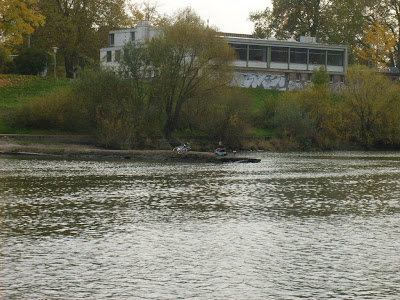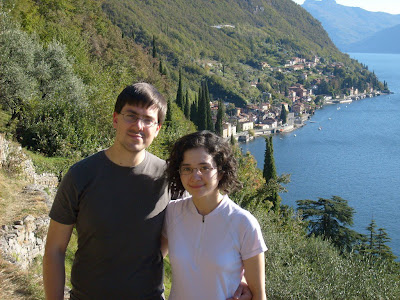So has this been useful? You bet it has!
- The OpenStreetMap maps contain useful points of interest, such as tourist attractions, railway stations and of course street names. The usefulness of this should be pretty obvious.
- In a continent that relies so heavily on rail travel, it's absolutely critical that one knows when to get off a train. In fact if you have big heavy backpacks, you need to start getting ready to disembark several minutes before the train stops, otherwise you're in big trouble! Having the GPSr tell you that your railway station is only 2000 metres away is amazingly useful. Completely solves the 'Is This Our Stop?' question. In fact, this aspect alone has been worth carrying the GPSr around with us.
- The 'estimated time to arrival' based on average velocity has proven to be a reasonably useful way to check the progress of a trip on trains and buses. It's not foolproof but it works well enough.
- The ability to easily mark your current location is a great way to locate your hotel later that evening, especially as it wasn't dark when you left...
- Barometric altimeter readings were useful today in deducing which track we were actually on in the Black Forest. It's also interesting to know you're eating a sandwich at 2,200 metres above sea level.
- The GPSr remembers where you've been. It's like a really long ball of string - you can easily retrace your steps when necessary. This has been useful in big cities like Budapest and Rome.
The downsides? Well, you still need to carry real maps (GPS enhances but does not replace conventional map use) and batteries can be a pain at times. Also, the OpenStreetMap maps are, to put it nicely, "under development". However in the main towns and cities they tend to be pretty good.
For the record, we have a Garmin eTrex Vista HCx - the high-sensitivity version. It can pick up a satellite lock indoors, on trains, under wet tree cover and even inside aircraft cabins. Don't bother with the older models as I doubt they'll work inside trains.
Other travelers we've met have been rather ambivalent towards the technology unfortunately. However those that took an active interest in our unit quickly realised the power of such a device. The rest of them will probably survive in happy ignorance, at least until they miss their next critical train stop :)





















































































